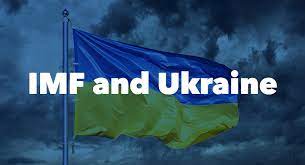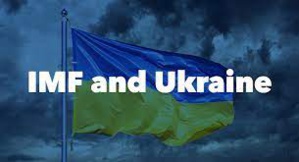A new $5 billion loan from the IMF would help persuade Ukraine's other creditors that the war-torn country's macroeconomic situation was under control, according to President Volodymyr Zelenskiy's main economic adviser on Friday.
According to the consultant, Oleg Ustenko, fresh financing from the International Monetary Fund for about 18 months might serve as the anchor for a larger package of $15 billion-$20 billion to help Ukraine weather the economic catastrophe precipitated by Russia's incursion.
He stated that Ukrainian officials have contacted the global lender about the likely request and that the goal should be to move through as soon as feasible.
There were no comments from the IMF.
Ustenko's remarks come little over two weeks after Ukraine's central bank governor, Kyrylo Shevchenko, told Reuters that he was seeking up to $20 billion from the IMF over two or three years - an amount that would have put Ukraine far above the fund's "exceptional access limit" for loans.
The scale of the request sparked heated debate within the IMF since it raised concerns about the sustainability of Ukraine's debt.
The updated plan would be fashioned after a financial package approved in 2015, following Russia's annexation of Ukraine's Crimea area, which included $17.5 billion in IMF funds but helped leverage total spending of $40 billion.
"An IMF program of $5 billion would be in line with earlier funding levels and might be a catalyst for funding from other sources, including the EU, (the U.S.) Treasury and other individual countries," Ustenko told Reuters.
In the early weeks of Russia's invasion, the IMF released $1.4 billion in emergency financing with few conditions, cancelling Ukraine's existing $5 billion credit agreement.
Ukrainian authorities have agreed to collaborate with the Fund to develop a new economic programme "aimed at rehabilitation and growth, when conditions allow."
As winter approaches, Ukraine, which is dealing with the internal displacement of over 7 million people as a result of Russia's invasion on February 24, is rushing to gather resources to deal with electricity shortages, growing inflation, and a deepening humanitarian situation.
According to experts, Egypt risks a 35%-45% economic decline in 2022 and a monthly fiscal gap of $5 billion, with barely a third of the $29 billion in Western aid pledges having materialised thus far.
Ukraine's international creditors agreed this week to a two-year moratorium on payments on over $20 billion in international bonds, but Ukraine must still make $635 million in principle payments on past IMF loans beginning in mid-September. more info
Ustenko stated that Ukraine planned to expedite negotiations with the IMF in order to obtain a preliminary agreement before the payments were due.
Proponents of the new initiative believe that before to the war, Ukraine had made good progress in eliminating deficits and corruption, and that the new lending would help it to stabilise the economy. However, detractors argue that a substantial additional loan could jeopardise the Fund because Russia could still win the conflict and refuse to honour Ukraine's obligations.
The Fund was established to be a "first responder to catastrophic systemic global economic crises," according to Mark Sobel, US chair of the OMFIF financial policy think tank and a former top Treasury official, and it should intervene to help Ukraine pay pensions and other obligations.
Martin Muehleisen, a former IMF strategy officer now connected with the Atlantic Council, believes that even a $5 billion loan would raise concerns about debt sustainability in the midst of a war and set dangerous precedents, moving the focus clearly to Western objectives.
"The IMF was used by the U.S. and its allies for strategic purposes during the Cold War. Tying the fund closer to the West’s political objectives may again be called for, but it would conflict with the IMF’s aspiration to be a truly global organization," Muehleisen said.
(Source:www.reuters.com)
According to the consultant, Oleg Ustenko, fresh financing from the International Monetary Fund for about 18 months might serve as the anchor for a larger package of $15 billion-$20 billion to help Ukraine weather the economic catastrophe precipitated by Russia's incursion.
He stated that Ukrainian officials have contacted the global lender about the likely request and that the goal should be to move through as soon as feasible.
There were no comments from the IMF.
Ustenko's remarks come little over two weeks after Ukraine's central bank governor, Kyrylo Shevchenko, told Reuters that he was seeking up to $20 billion from the IMF over two or three years - an amount that would have put Ukraine far above the fund's "exceptional access limit" for loans.
The scale of the request sparked heated debate within the IMF since it raised concerns about the sustainability of Ukraine's debt.
The updated plan would be fashioned after a financial package approved in 2015, following Russia's annexation of Ukraine's Crimea area, which included $17.5 billion in IMF funds but helped leverage total spending of $40 billion.
"An IMF program of $5 billion would be in line with earlier funding levels and might be a catalyst for funding from other sources, including the EU, (the U.S.) Treasury and other individual countries," Ustenko told Reuters.
In the early weeks of Russia's invasion, the IMF released $1.4 billion in emergency financing with few conditions, cancelling Ukraine's existing $5 billion credit agreement.
Ukrainian authorities have agreed to collaborate with the Fund to develop a new economic programme "aimed at rehabilitation and growth, when conditions allow."
As winter approaches, Ukraine, which is dealing with the internal displacement of over 7 million people as a result of Russia's invasion on February 24, is rushing to gather resources to deal with electricity shortages, growing inflation, and a deepening humanitarian situation.
According to experts, Egypt risks a 35%-45% economic decline in 2022 and a monthly fiscal gap of $5 billion, with barely a third of the $29 billion in Western aid pledges having materialised thus far.
Ukraine's international creditors agreed this week to a two-year moratorium on payments on over $20 billion in international bonds, but Ukraine must still make $635 million in principle payments on past IMF loans beginning in mid-September. more info
Ustenko stated that Ukraine planned to expedite negotiations with the IMF in order to obtain a preliminary agreement before the payments were due.
Proponents of the new initiative believe that before to the war, Ukraine had made good progress in eliminating deficits and corruption, and that the new lending would help it to stabilise the economy. However, detractors argue that a substantial additional loan could jeopardise the Fund because Russia could still win the conflict and refuse to honour Ukraine's obligations.
The Fund was established to be a "first responder to catastrophic systemic global economic crises," according to Mark Sobel, US chair of the OMFIF financial policy think tank and a former top Treasury official, and it should intervene to help Ukraine pay pensions and other obligations.
Martin Muehleisen, a former IMF strategy officer now connected with the Atlantic Council, believes that even a $5 billion loan would raise concerns about debt sustainability in the midst of a war and set dangerous precedents, moving the focus clearly to Western objectives.
"The IMF was used by the U.S. and its allies for strategic purposes during the Cold War. Tying the fund closer to the West’s political objectives may again be called for, but it would conflict with the IMF’s aspiration to be a truly global organization," Muehleisen said.
(Source:www.reuters.com)






